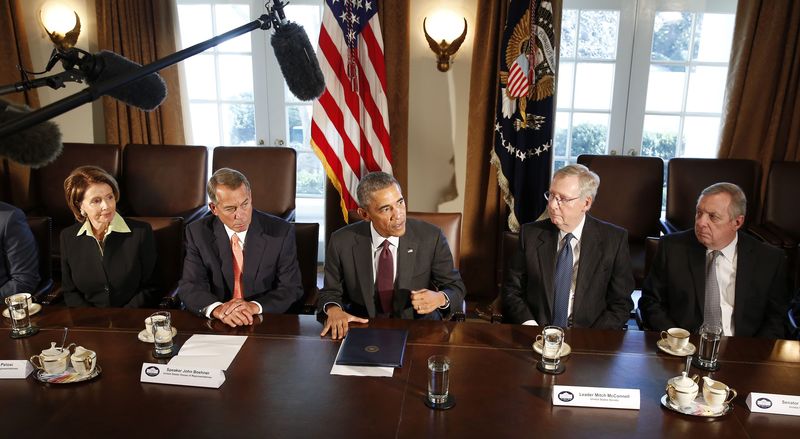By Steve Holland
WASHINGTON (Reuters) - U.S. President Barack Obama on Tuesday pledged to work with Republican and Democratic lawmakers on a formal authorization of the use of military force against Islamic State militants after taking a go-slow approach to the topic last year.
The agreement came during a White House meeting with bipartisan congressional leaders during which Obama sought to develop a better working relationship with Congress for the year after the partisan bickering that has marked much of his presidency.
The Obama administration has argued that its five-month-long campaign of air strikes in Iraq and Syria against Islamic State militants is legal, based on authorization passed in the early 2000s under President George W. Bush for the Iraq War and fighting al Qaeda and associated groups.
But several members of Congress have said it would be preferable to debate and pass a new authorization for combating Islamic State fighters, who have killed thousands of people while seizing swaths of territory in Iraq and Syria. The White House had set the issue aside until now.
"The president committed to working with members of both parties on text for an AUMF (authorization of military force) that Congress can pass to show the world America stands united against ISIL," the White House said, using an acronym for Islamic State.
Senate Majority Leader Mitch McConnell welcomed the step, telling reporters later that a good starting place for Obama is "for him to tell us what he wants, and to provide the initial document." He said he expected it in the near future.
Obama, who has been criticized by both Republicans and Democrats for not developing closer relationships with lawmakers, brought in 16 congressional leaders to the White House to take stock of what is possible this year now that both houses of Congress are led by Republicans.
Obama enters the new year in a stronger political position due to improved economic growth.
Despite a Republican rout in November mid-term elections, Obama has seen a slight rebound in his job approval numbers, and he and his aides say he has six to nine months to achieve major priorities before the country turns its attention to the campaign to replace him in 2016.
In his opening remarks to the congressional leaders, Obama mentioned cybersecurity, trade and tax reform as three areas where agreement might be found.
"We're in a position to make sure that 2015 is an even stronger year. And relative to our competitors, we are holding much better cards. The key now is for us to work as a team to make sure whether we build on this progress," Obama said.
Boehner, however, raised the prospect of constructing the long-stalled Keystone XL pipeline. Obama has pledged to veto legislation that would require him to approve construction of the Canada-to-Texas pipeline.

Boehner also made clear the House would push ahead with a funding bill for the Homeland Security Department that would cut funds for use in carrying out Obama's executive action late last year to relax U.S. policy toward illegal immigrants.
(additional reporting by Patricia Zengerle; Editing by Susan Heavey, James Dalgleish and Ken Wills)